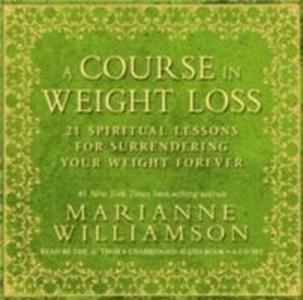
Marianne Williamson (born July 8, 1952)is a spiritual activist, author, lecturer and founder of The Peace Alliance, a grass roots campaign supporting legislation currently before Congress to establish a United States Department of Peace. She is also the founder of Project Angel Food, a meals-on-wheels program that serves homebound people with AIDS in the Los Angeles area.
She has published ten books, including four New York Times #1 bestsellers.

Title: A Course in Weight Loss: 21 Spiritual Lessons for Surrendering Your Weight Forever
Author: Marianne Williamson
Publisher: Hayhouse Inc, 2010
Pages: 299 pages
Original Language:English
Firstly let me say that I read this book as an atheist. I didn't know it was written from a christian viewpoint, but I am open to "spiritual" stuff in general so once I realized it I kept listening anyway. I recently enjoyed a selfhelp book by the Dalai Lama even though I don't agree with him on many points, I still found it to be true in a lot of places.
So why is this book so bad?
Firstly, the title is completely misleading. This is not about weightloss, it's aimed at people who have trouble compulsively overeating. Seeing as how 90% of women want to lose weight but only a fraction of these overeat compulsively "a course to beat overeating" probably wouldn't have sold as well, I get it.
Really though, this is one of the PLUS points of this book: It does not focus on getting skinny much. It talks of eating unhealthy things your body does not want and being obsessed by the desire to overindulge and binge. Selfhelp books for this are much more applaudable than just another "get-to-size-0 now despite you being healthy and fine" books.
On the other hand, the book doesn't even mention the possibility that there are people who want to lose weight despite not being unhealthy and who are already in tune with their bodies. And there are many of those.
Now, the religious part. I could deal with the "prayers" she advises. I could deal with the constant direct appeal to God à la "Dear God, let me stop eating bad food and find inner peace, amen." I could even somehow manage to understand why it could help to constantly see yourself as one with God for inner Peace, if I changed the "God" to "universe" and "nature" it mostly still made sense. But still it annoyed me that it wasn't not only ignorant to atheist beliefs but also to any other religious belief.
The thing that flipped me off was that she, very literally, says that if you do not let god lead your way and if you do not pray to him daily there is no way to ever be happy, fulfilled and to stop overeating. Oh, sorry, but I'm pretty sure there are people who've managed to beat overeating without praying. Love? Yes, but selflove and love of and for other human beings, for the world, the universe, but not a bible-induced figure.
There are some practical things in there that make sense, but you can get that from any other self-help book. Really, this is only for the ignorant religious reader. And if you consider yourself an open-minded tolerant Christian yet found yourself enjoying the book, at which part you're being honest to yourself.
Plus, do you really want to build a shrine and put the book on there and have friends down with you and pray for your weightloss? Why not try other methods to get more comfortable with yourself and your body? And if you really have a problem with food and eating, there are much better selfhelp books out there.
Williamson seems like a nice enough woman but a very kooky religious freak nonetheless. I also had to laugh at the idea that there is scientific proof that praying for others helps them heal. In fact all I have found is a study that shows it's not true: "Praying for the sick does not help, study finds"
Fitting Music:







